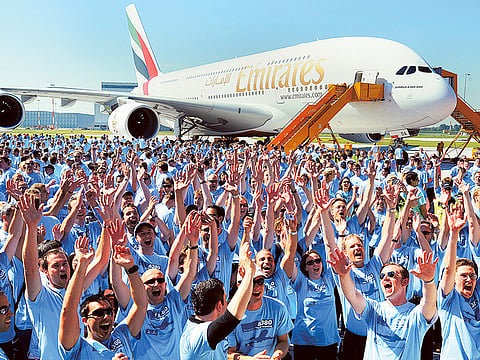The Airbus A380, the flagship of the Emirates fleet
Emirates is the single largest operator of the A380 with 60 in its fleet from a total order of 140

Dubai: Ten years ago, the world’s largest passenger jet, the Airbus A380-800, completed its maiden test flight. Thirty months later it entered into commercial service with Singapore Airlines flying it from Singapore to Sydney, Australia. A year later, in 2008, Emirates started operating the aeroplane.
Today, Emirates is the single largest operator of the A380 with 60 in its fleet from a total order of 140.
“Emirates ‘IS’ the A380 programme, it has been instrumental to the aircraft success due to its massive orders,” said John Strickland, director of UK-based JLS Consulting, by email.
The A380 programme was troubled by production issues and delays. It entered into service 18 months after schedule due to wiring problems that came at a time of boardroom upheaval at Europe’s largest plane maker.
So far, there has been orders from 17 different customers of which Emirates has been by far the most significant. The airline first ordered 21 of the jet in 2003 and increased the order to 90 by 2010. In 2013, at the Dubai Airshow, Emirates announced an order for another 50 bringing the total order to 140, which is where it sits today.
“We sent a clear message [at the Dubai Airshow] that one of the biggest players in the international aviation community was buying the A380 because we really believe in it,” Emirates President Tim Clark told reporters at a press conference in London two weeks ago after announcing a $9.2 billion (Dh34 billion) engine order with British engine maker Rolls-Royce for the 50 of the jets bought in 2013.
The A380 programme has cost Airbus $25 billion to develop and at $440 million each the plane maker has struggled to fill its order book. As of December 2014, Airbus has delivered nearly half of the 317 firm orders. In 2000, when it was marketing the superjumbo that seats around 550 passengers, Airbus intended to sell 1200 aircraft.
But Clark is a firm believer in the aircraft and on a number of occasions has called it the “flagship” of the Emirates fleet.
“We make money and good money out of it,” he said.
Clark, who wants to one day replace all 140 A380s on order with the same sized aircraft if not bigger, has been calling on Airbus to commit to a more fuel efficient new engine option (neo) model.
Break even
But there are concerns and frustrations within Airbus over the A380 programme. Late last year, Airbus Finance Director, Harold Wilhelm, told analysts the programme would break even up to 2018, “if we would do something on the product, or even if we would discontinue the product”.
Clark blasted the comments shortly after.
“Airbus faces a dilemma” Strickland said of the calls for a neo model
“It would win new orders if it made the recommended changes requested by Emirates but this requires more investment on a programme with limited profitability and with uncertainty about how many orders might be achieved from other airlines,” he said.
Emirates wants a combination of a re-engine, weight reduction and change in the aerodynamics of the superjumbo.
“I would hope the improvement would be in the range of 10-13 per cent,” Clark said while also touting the ability of Rolls-Royce to make the engine for the neo.
Rolls-Royce Chief Executive, John Rishton, sitting next to Clark at the London press conference, said the British engine maker would be interested if Airbus was to commit.
Other airlines in the Gulf have also found a use for the super jumbo. Etihad Airways has ordered 10 and the super jumbo is the only aircraft in its fleet to feature “The Residence” which is made up of three rooms and comes with its own butler, at the cost of $20,000 for a flight from Abu Dhabi to London. Qatar Airways has ordered 13 and the aircraft is the only one on its fleet to feature a first class option.
Clark says he does not understand why other carriers have not lined up for orders, which he said is perfect for slot constrained airports such as London’s Heathrow.
Committed
“Certainly it’s a workhorse for Emirates and other airlines are happy with its performance. It’s ideal for high volume routes and capacity constrained airports,” Strickland said.
Clark said in London that Emirates is committed to the A380 programme even if Airbus does not commit to the neo version.
“Even in the absence of the neo we still would have bought more of these aeroplanes. After all we want to replace our existing ones and grow our business,” he said.
Strickland said the future of the A380 is “moderately bright”.
“The challenge is that the projected market size is considerably less than that for other long haul aircraft which tend to be smaller in size and powered by two rather than four engines. These are the ones which the world’s airlines are lining up to buy in the greatest numbers,” he said.
Sign up for the Daily Briefing
Get the latest news and updates straight to your inbox



